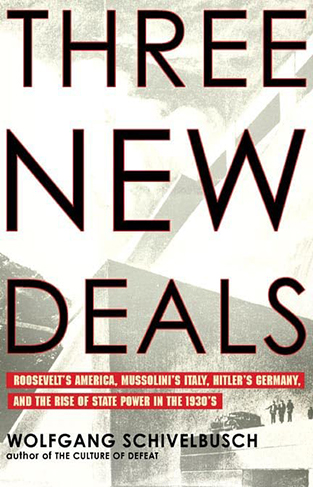- Home
- Books
- Sale
- Online Book Bazar Up To 60%
- 20% OFF
- Three New Deals: Reflections on Roosevelt's America, Mussolini's Italy, and Hitler's Germany, 1933
Three New Deals: Reflections on Roosevelt's America, Mussolini's Italy, and Hitler's Germany, 1933
By: Wolfgang Schivelbusch
-
Rs 640.00
- Rs 800.00
- 20%
You save Rs 160.00.
Due to constant currency fluctuation, prices are subject to change with or without notice.
We're Offering A High Discount On This Book As It Is Slightly Damaged
From a world-renowned cultural historian, an original look at the hidden commonalities among Fascism, Nazism, and the New Deal
Today Franklin Delano Roosevelt's New Deal is regarded as the democratic ideal, the positive American response to an economic crisis that propelled Germany and Italy toward Fascism. Yet in the 1930s, shocking as it may seem, these regimes were hardly considered antithetical. Now, Wolfgang Schivelbusch investigates the shared elements of these three "new deals" to offer a striking explanation for the popularity of Europe's totalitarian systems.
Returning to the Depression, Schivelbusch traces the emergence of a new type of state: bolstered by mass propaganda, led by a charismatic figure, and projecting stability and power. He uncovers stunning similarities among the three regimes: the symbolic importance of gigantic public works programs like the TVA dams and the German autobahn, which not only put people back to work but embodied the state's authority; the seductive persuasiveness of Roosevelt's fireside chats and Mussolini's radio talks; the vogue for monumental architecture stamped on Washington, as on Berlin; and the omnipresent banners enlisting citizens as loyal followers of the state.
Far from equating Roosevelt, Hitler, and Mussolini or minimizing their acute differences, Schivelbusch proposes that the populist and paternalist qualities common to their states hold the key to the puzzling allegiance once granted to Europe's most tyrannical regimes.
We're Offering A High Discount On This Book As It Is Slightly Damaged
From a world-renowned cultural historian, an original look at the hidden commonalities among Fascism, Nazism, and the New Deal
Today Franklin Delano Roosevelt's New Deal is regarded as the democratic ideal, the positive American response to an economic crisis that propelled Germany and Italy toward Fascism. Yet in the 1930s, shocking as it may seem, these regimes were hardly considered antithetical. Now, Wolfgang Schivelbusch investigates the shared elements of these three "new deals" to offer a striking explanation for the popularity of Europe's totalitarian systems.
Returning to the Depression, Schivelbusch traces the emergence of a new type of state: bolstered by mass propaganda, led by a charismatic figure, and projecting stability and power. He uncovers stunning similarities among the three regimes: the symbolic importance of gigantic public works programs like the TVA dams and the German autobahn, which not only put people back to work but embodied the state's authority; the seductive persuasiveness of Roosevelt's fireside chats and Mussolini's radio talks; the vogue for monumental architecture stamped on Washington, as on Berlin; and the omnipresent banners enlisting citizens as loyal followers of the state.
Far from equating Roosevelt, Hitler, and Mussolini or minimizing their acute differences, Schivelbusch proposes that the populist and paternalist qualities common to their states hold the key to the puzzling allegiance once granted to Europe's most tyrannical regimes.
Three New Deals: Reflections on Roosevelt's America, Mussolini's Italy, and Hitler's Germany, 1933
By: Wolfgang Schivelbusch
Rs 640.00 Rs 800.00 Ex Tax :Rs 640.00
Zubin Mehta: A Musical Journey (An Authorized Biography)
By: VOID - Bakhtiar K. Dadabhoy
Rs 840.00 Rs 1,050.00 Ex Tax :Rs 840.00
Myths Illusions and Peace: Finding a New Direction for America in the Middle East
By: Dennis Ross
Rs 1,095.00 Ex Tax :Rs 1,095.00
Operation Dark Heart: Spycraft And Special Ops On The Frontlines Of Afghanistan And The Path To Victory
By: Anthony Shaffer
Rs 1,800.00 Rs 2,250.00 Ex Tax :Rs 1,800.00
Anna Hazare: The Face Of Indias Fight Against Corruption
By: Pradeep Thakur
Rs 300.00 Ex Tax :Rs 300.00
How To Win A Cosmic War God Globalization And The End Of War
By: Reza Aslan
Rs 695.00 Ex Tax :Rs 695.00
Witness To America: A Documentary History Of The United States From The Revolution To Today
By: Douglas Brinkley
Rs 4,495.50 Rs 4,995.00 Ex Tax :Rs 4,495.50
No recently viewed books available at the moment.
Zubin Mehta: A Musical Journey (An Authorized Biography)
By: VOID - Bakhtiar K. Dadabhoy
Rs 840.00 Rs 1,050.00 Ex Tax :Rs 840.00
Three New Deals: Reflections on Roosevelt's America, Mussolini's Italy, and Hitler's Germany, 1933
By: Wolfgang Schivelbusch
Rs 640.00 Rs 800.00 Ex Tax :Rs 640.00














-120x187.jpg?q6)














